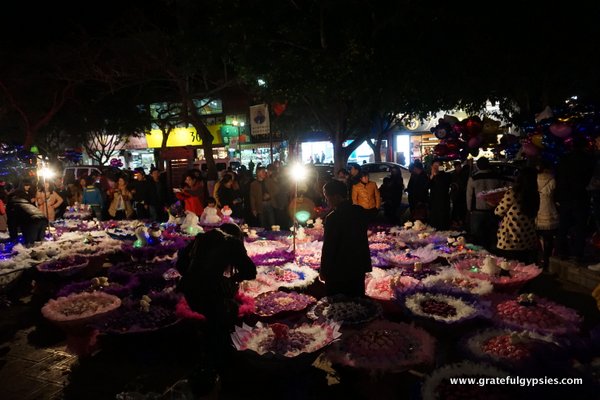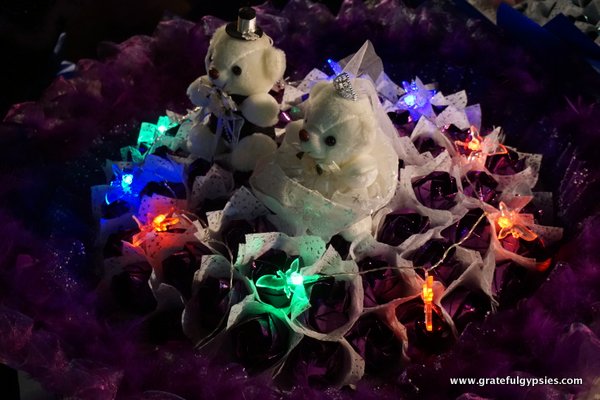Valentine’s Day in China Posted by sasha on Feb 13, 2017 in Culture, Vocabulary
In addition to its many traditional festivals, China has taken to celebrating plenty of holidays from Western culture as well. You might see Santa around Christmas and zombies on Halloween, and you’ll also see smooching couples out and about on Valentine’s Day (情人节 – qíng rén jié). Although China has its own holiday for lovers – the Qi Xi Festival (七夕节 – qī xì jié) – February 14th is just as popular, if not more so. Let’s learn a bit of Chinese related to this romantic holiday and see how people celebrate Valentine’s Day in China.
If you translate the Chinese name for Valentine’s Day directly, it’s “Lover’s Festival.” It’s a day to spend with your lover (情人 – qíng rén). Here are a few words to describe your lover:
-
boyfriend (男朋友 – nán péng yǒu)
-
girlfriend (女朋友 – nǚ péng yǒu)
-
fiancé/fiancée (未婚夫/未婚妻 – wèi hūn fū/wèi hūn qī)
-
husband (丈夫 – zhàng fū)
-
wife (妻子 – qī zi)
Of course, this is a day to express your love (爱情 – Ài qíng). Just like in the West, it’s common for a couple to go out on a date (约会 – yuē huì). Perhaps a romantic (浪漫 – làng màn) night out, like a candlelit dinner (烛光晚餐 – zhú guāng wǎn cān).
Guys are expected to give their lady a gift (礼物 – lǐ wù). That’s right, Chinese guys are duped into buying things on Valentine’s Day as well. Here are the most common examples:
-
teddy bear (泰迪熊 – tài dí xióng)
-
red rose (红玫瑰 – hóng méi guī)
-
a box of chocolate (一盒巧克力 – yī hé qiǎo kè lì)
-
flowers (鲜花 – xiān huā)
-
candy hearts (心型糖果 – xīn xíng táng guǒ)
In addition to a gift, you should also give your sweetie a hug (拥抱 – yōng bào), hold hands (双手抱 – shuāng shǒu bào) and kiss (吻 – wěn, or 亲 – qīn).
Of course, the most common phrase you’ll hear on Valentine’s Day is “I love you” (我爱你 – wǒ ài nǐ). If you really want to impress with your Chinese skills though, try some of these out:
I love you passionately.
我热烈的爱着你 – wǒ rè liè de ài zhe nǐ
In my heart there is only you.
我的心里只有你 – wǒ de xīn lǐ zhǐ yǒu nǐ
I’m crazy in love with you.
我疯狂的爱着你 – wǒ fēng kuáng de ài zhe nǐ
I hope to grow old with you.
我希望能跟你一起变老 – wǒ xī wàng néng gēn nǐ yī qǐ biàn lǎo
In a sign of the increasingly digital times we live in, it’s more and more common to send a coded text message of love using numbers. Here are a few examples:
-
520 (wǔ èr líng) = I love you (我爱你 – wǒ ài nǐ)
-
530 (wǔ sān líng) = I miss you (我想你 – wǒ xiǎng nǐ)
-
770 (qī qī líng) = Kiss you (亲亲你 – qīn qīn nǐ)
-
880 (bā bā líng) = Hug you (抱抱你 – bào bào nǐ)
Now you’re all set for Valentine’s Day in China. If you’re a single person (单身 – dān shēn), never fear – you’ve got your own holiday, too! You just have to wait half a year for it, as China celebrates Single’s Day on 11/11.

Build vocabulary, practice pronunciation, and more with Transparent Language Online. Available anytime, anywhere, on any device.






Leave a comment: